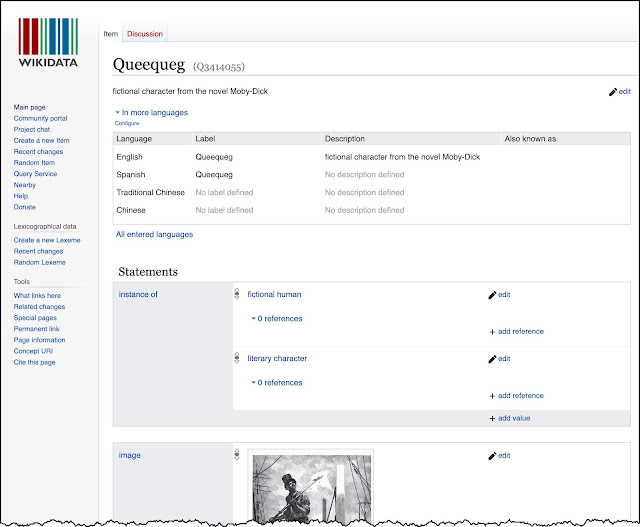Let’s think about this…
I’ve been enjoying reading all of the comments on the post, watching as people try different search strategies to get at this question. (A general comment–they’re mostly pretty good! Nice job, SRS-folk!)
This week I asked about characters with a distinctive names (to wit, Starbuck and Queequeg from Moby Dick by Herman Melville), and I asked “… how often these names from Moby Dick appear as characters in other works of fiction.” Specifically:
1. Can you find a way to identify other major works of fiction (leaving out fan-fiction for the moment) in which the names of “Starbuck” and “Queequeg” appear (either independently or together)?
This is very much like a standard Library Reference Question (see this list for some actual reference questions that have been asked by library patrons). It’s a bit, shall we say, “open ended.”
There are several ambiguities here:
a. what languages are covered here? I realize that, implicitly, I meant English–but that’s doing a disservice to the rest of the world. For all I know, Queequeg might be HUGE in German-speaking countries. Let’s include all languages.
b. what counts as a “major work of fiction”? Again, I had meant to say “written works of fiction,” but as SRS regulars point out, that leaves out a lot of content (esp. television, movies, etc.) So let’s modify our Challenge to include “fiction in whatever medium that is larger than a niche publication.” (I leave it to you to define niche.)
My approach to this question came from a realization when I was reading the Wikipedia entry about Queequeg. Two things caught my attention. First, was the section called “Cultural references” — meaning, references to the topic (Queequeg) in other cultural uses.
That’s one source of insights about “other works.” Another is the purple box at the bottom of the Wiki page:
You can see a list of other works here as well. See, for instance, the book by Ray Bradbury, Green Shadows, White Whale, a book that gives a fictionalized version of his trip to Ireland. This book includes a few references to Queequeg, and counts as a major work. (Check out the Queequeg mentions on Google Books.)
But.. I realize that this is an automatically generated figure. THIS means that there’s some database somewhere in Wiki-land that’s creating the box table and its contents.
That’s right! I recall that Wikipedia has an entire Wikidata underneath it.
I did a quick Command-F/Control-F for Wikidata on the page and was taken to a new land of discovery–the Wikidata! If you click on the Wikidata link you’ll be taken to the Wikidata item for Queequeg!
There are new riches to be found here.








